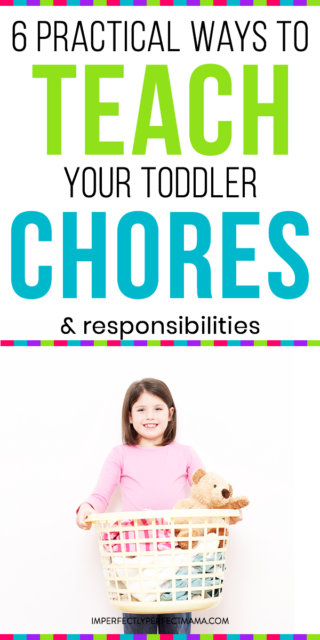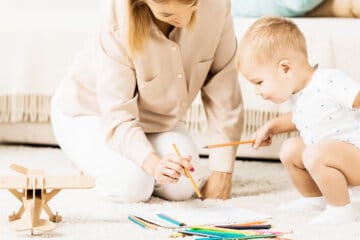“Mommy, can I help you?”

My two year old asks me this question almost every day and while it’s sometimes tempting to say I’ll do it myself (because that would be quicker than having her help me), I know that letting her help me is teaching her some important skills and independence.
I think most parents would agree that kids should learn basic responsibility through things like taking care of their belongings, their pets and themselves.
These chores are what help them to grow into responsible adults one day.
What may be up for debate is how early kids can start learning to do chores.
By the time a child enters elementary school, they’ll probably have learned basic things like cleaning up after themselves, proper hygiene, and some easy housekeeping tasks. But did you know that kids can learn how to do chores even earlier than that?
After having four kids one of the biggest things I’ve learned is that it’s never too early to teach kids chores and responsibility.
Toddlers are eager to learn and usually want to help out in any way that they can.
It can be tempting to view them as a distraction or a hindrance to getting work done in a timely manner, but with a little coaching and demonstration, toddlers are willing to be good helpers and learn how to help out with chores around the house.
Why Toddlers Make Good Helpers

Have you ever seen those fun little broom and dustpan sets or those toy vacuum cleaners that light up and make vacuuming sounds?
There is a reason they are marketed to young preschool aged kids.
Because at that age, kids are discovering how the world works and wanting to learn as much as they can by hands on experience.
They can see that adults care for the house by sweeping, mopping, wiping and vacuuming.
They want to help because they want to be able to do those things, too.
And unlike many adults, toddlers don’t yet see it as a burdensome task that has to be done, they see it as a fun learning experience.
With that knowledge, why not let them be your helper? The best helpers (no matter the age) are eager to learn and want to try over and over again until they have perfected a task to the best of their ability.
So let them help by watching you, mimicking you and following your directions. Soon they’ll have a sense of accomplishment in their newfound abilities and be able to do it by themselves.
How to Teach Your Toddler a New Skill
None of us were born knowing how to do the things we can do now.
We had to be taught and practice for a while until we got it.
Toddlers are the same way. Each new skill should be taught with patience and love until they can do it on their own.
Here are some tips for teaching a toddler a new skill.
1. Talk to Them About the Tasks You’re Doing
Just like babies, toddlers can learn by watching and by listening. As you go through the day doing different tasks and chores, say out loud what you’re doing.
“Now I’m going to wipe the table.”
“See how I’m spraying the table and using a towel to clean it?”
This will not only help them understand what you’re doing, but it can increase your toddler’s vocabulary, too.
2. Demonstrate In a Slow Deliberate Manner
It may feel silly at first, but use repetitive motions and be slow and deliberate when you are showing your toddler how to do something.
Remember they are processing information as they watch and slowing down will help them grasp the concept better.
3. Use Words like “First,” “Next,” and “Last”
To teach the order in which to perform a task, help them understand by using words that signal what comes first and each subsequent step. They can even say it out loud to help them remember the steps better.
4. Ask Them Questions to See if They Understand
Once you’ve demonstrated a task a few times, ask them questions to see if they are following along and understand what you’ve taught.
Make it conversational or use fill-in-the-blank phrasing like, “We place our plates and cups on the ___ when it’s time to eat.”
5. Let Them Practice a Skill First with Help Then on Their Own
After explaining a task and using it in conversation to make sure they understand it, let them try it themselves. There’s no better teacher than experience.
Work with them to hold the broom just right or to refill the dog food bowl. Do this a few times and then let them start trying things on their own.
It won’t be perfect but they’ll feel so accomplished and be one step closer to being able to do it independently.
6. Create Opportunities for Practice
Whenever you know you’ll be doing a task that you’ve shown them before, try to get them involved again. Create opportunities for them to practice their new-found skills to get better at it.
Make it Fun and Encouraging
All of these suggestions can be done in a fun way such as call and response, with singing, using numbers and letters or even dancing. They key is to make it enjoyable for you and them.
And the most important thing to do is to always encourage them.
It feels good to have someone tell you that you are doing well at something. It gives motivation to keep doing it and makes you feel like you’re an asset.
Toddlers feel this, too. So encourage them when you can and make sure they know how much you appreciate their willingness to help and to work hard.
A Toddler’s Sense of Accomplishment
Once your toddler has practiced and perfected a skill, they have a big sense of accomplishment that will help give them confidence in themselves.
Even as adults, we take pride in learning new things. It’s basic human nature to want to feel a sense of pride and accomplishment. Young kids can use that pride to fuel their motivation to want to learn more.
This will help them not only as a young child learning basic chores, but also aide them in school and throughout the rest of their lives.




Leave a Reply